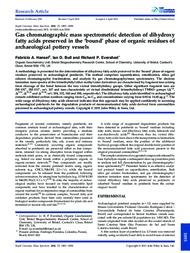Gas chromatographic mass spectrometric detection of dihydroxy fatty acids preserved in the 'bound' phase of organic residues of archaeological pottery vessels.
Gas chromatographic mass spectrometric detection of dihydroxy fatty acids preserved in the 'bound' phase of organic residues of archaeological pottery vessels.
Author(s): HANSEL, F. A.; BULL, I. D.; EVERSHED, R. P.
Summary: A methodology is presented for the determination of dihydroxy fatty acids preserved in the ‘bound’ phase of organic residues preserved in archaeological potsherds. The method comprises saponification, esterification, silica gel column chromatographic fractionation, and analysis by gas chromatography/mass spectrometry. The electron ionisation mass spectra of the trimethylsilyl ether methyl ester derivatives are characterised by fragment ions arising from cleavage of the bond between the two vicinal trimethylsiloxy groups. Other significant fragment ions are [M–15]+., [M–31]+., m/z 147 and ions characteristic of vicinal disubstituted (trimethylsiloxy) TMSO? groups (?7,8, ?9,10,?11,12 and ?13,14: m/z 304, 332, 360 and 388, respectively). The dihydroxy fatty acids identified in archaeological extracts exhibited carbon numbers ranging from C16 to C22 and concentrations varying from 0.05 to 14.05 ?g g?1. The wide range of dihydroxy fatty acids observed indicates that this approach may be applied confidently in screening archaeological potsherds for the degradation products of monounsaturated fatty acids derived from commodities processed in archaeological pottery vessels.
Publication year: 2011
Types of publication: Journal article
Unit: Embrapa Forestry
Keywords: Arqueologia, Cromatografia Gasosa
Observation
Some of Embrapa's publications are published as ePub files. To read them, use or download one of the following free software options to your computer or mobile device. Android: Google Play Books; IOS: iBooks; Windows and Linux: Calibre.
Access other publications
Access the Agricultural Research Database (BDPA) to consult Embrapa's full library collection and records.
Visit Embrapa Bookstore to purchase books and other publications sold by Embrapa.

